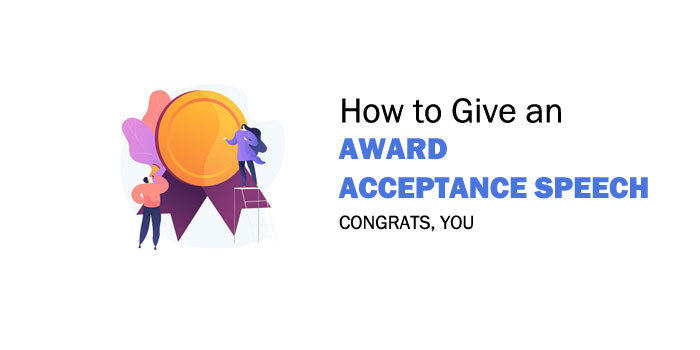How to Give an Award Acceptance Speech to Thank, Inspire and Impress
Let’s say you got nominated for an award and now you have to give an acceptance speech. It’s pretty important to give a good speech, no matter what you’re being awarded for. Looking good doesn’t hurt either!
So, how do you give a good acceptance speech for your award? First off, you should ask yourself what message you would like to convey to your audience.
Generally, an acceptance speech provides the speaker with an opportunity to not only thank the individuals who helped you win the award but also highlight ideas and issues that you care about and even inspire people to do something even bigger.
Which is why it’s important that you don’t mess up.
Writing a good speech, any kind of speech, requires a lot of time and preparation, in order to ensure that you are well prepared and have included any important details that you would prefer to not leave out.
Here are a few practical tips on how you can draw up your award acceptance speech.
What is an Award Acceptance Speech?
This is a type of speech given by an individual who’s receiving a prize, honor or an award. It is an unwritten tradition to share gratitude to individuals who you’d like or acknowledge or thank by giving a few words.
Your audience may be made up of your family and friends but also individuals in your industry who you respect and admire, so when giving an acceptance speech, ensure you make the best of it.

As compared to other speeches, an acceptance speech does not include a beginning, body or conclusion and doesn’t need a PowerPoint display. In addition to this, acceptance speeches aren’t allotted a lot of time as you would with a keynote speech, so you will have to make it short.
Acceptance speeches also provide you, the speaker who’s accepting the award, an opportunity to either make a great impression, no impression or a terrible one. So, you have to be careful with how you write up and give your speech.
What are the main Goals of an Acceptance Speech?
Your goals with regard to this speech should be to;
- Thank the individuals who helped you in whatever you did or in your career
- Center on one idea that you want to leave your audience with, whether it’s motivating them to work hard or inspiring them to follow their dreams
- Make a great impression
Since you’ll only have a few minutes to give your speech, focusing on one point or one of the most important lessons you’ve learnt in life is a good way to go.
Additionally, your speech should give your audience a favorable impression about you while also letting them know that you’ve thought about what you’ve said and that you’re respectful.
How to Write a Great Acceptance Speech
Most individuals who win an award start by thanking the individuals who helped them when they accept it.
There are many different ways of thanking people, so which one is applied in this context? Being as specific as possible when thanking individuals is the best way to go.
Therefore, you should start by:
Be Specific
Thank people by telling them exactly what they did that assisted you
You should do this in a way that is meaningful. Saying “Thank you for your support” doesn’t really mean anything.

So instead, you should look at the individuals you mention and while addressing them by their names, thank them while telling them what exactly you are thanking them for.
For instance, you can say, “Lisa, you encouraged me after being rejected by 7 different publishing houses, you were there for me.”
This will make your speech much more interesting to your audience while also appearing sincere.
Pro-Tip: Make eye contact when thanking every individual while mentioning their name, as it will not only convey respect but also sincerity.
Tell a story
Great award acceptance speeches usually tell stories. While the time allotted to give your speech may be short, 30 seconds is enough time to give a short story.
You can either;
- Recount an actual conversation you had with someone; be it a family member colleague or friend, about a challenge you had, how you conquered it and its relevance to the award you’re accepting.
Or,
- Talk about an encounter that happened
Keep in mind though that if you’ll be telling a story, ensure that its relevant to the award, it’s brief and that you tell it in a way that captivates your audience.
Now that we’ve discussed how to prepare for and write your acceptance speech, we can now look into how you will deliver that speech.
How to Prepare for an Award Acceptance Speech?
Nothing is worse than having no speech prepared when you win a major award; fumbling on stage in front of an audience is not a good thing for anyone.
It also shows the individuals who nominated you that you do not respect them, so take some time and prepare.
First and foremost,
Make your speech memorable
Many of the speeches given at award shows are short, so if it isn’t memorable, it can easily be forgotten.
Good thing is you have a lot of resources at your disposal, the biggest being the internet. Thank heavens for technology! Everyone, including yourself, wants to give a great speech. Looking up great acceptance speeches on YouTube will provide you with amazing examples of great speeches.

Most of these examples are short, as acceptance speeches should be. Besides this, they also seen genuine, contain an emotional moment and are funny.
You may not have a funny bone in your body, which is okay as being funny will entirely be dependent on what you’ll be talking about in your speech. So, no pressure.
Rehearse your speech
It may sound ridiculous to practice your acceptance speech, especially considering that it’s brief. However, this is a great way to modify your speech to your liking.
You can do this by recording yourself giving your speech using your camera or phone.
Looking through the recording will help you pick out what you don’t like and what you like about it. This allows you to repeat your speech as many times as you want while implementing the changes you’d like until you feel happy and comfortable with its final form.
Once you are satisfied with your final take, know you already have it in the bag; you’re going to give a great speech!
Pro-Tip: Practicing helps get rid of the jitters and helps you feel more confident in both yourself and your speech.
How To Deliver Your Acceptance Speech
When delivering your acceptance speech, ensure that it’s at least entertaining. It doesn’t have to make the audience laugh so much that their ribs hurt. However, it also shouldn’t be so boring that people doze off or make conversation while you address them.
So, first off,
Don’t Be Boring
If your speech doesn’t have a few jokes in it or isn’t funny, at least try to include some emotion or a dramatic moment. Boring speeches make people want to gorge their eyes out and seal their ears, so they don’t have to look at you and hear you drone on. Don’t subject your audience to unnecessary torture.

Be entertaining. At the very least, say something entertaining, interesting or amusing, even if you’ll be making fun of yourself.
If you are going to show emotion, don’t go overboard
Blubbering through your speech isn’t interesting, so try to keep it together. This is where practicing your speech comes in, it helps you show just the right amount of emotion while still conveying your message to the audience.
Pro-Tip: A little emotion goes a long way, so don’t overdo it.
Using what we have so far discussed, you should be able to not only write a great speech but also present your speech to your audience in a memorable way.
Now, let’s look at a few things to avoid when giving your acceptance speech.
What to avoid in an Award Acceptance Speech
This only uses up more time. Instead, use the time you’ve been given to the maximum advantage.
Even though you might be nervous, other people may not recognize that you are. So, there’s no need to waste valuable time.
By the way, deliberately pausing or speaking slowly helps you overcome any jitters you may have. Thank me later once you try this trick of the trade.
Given that you’ll only have a few minutes to give your speech (at most), try to thank no more than five individuals.
You can send the people you didn’t thank on stage personal notes; that’s why such notes exist.
Not only is this devoid of sincerity, emotion and personality but it also looks scripted. Again, practicing helps you capture your main points in mind.
In conclusion, it all comes down to being genuine when thanking individuals, entertaining and leaving your audience with a good life lesson or something that inspires them. Show your audience that you, indeed, were worthy of getting that award!
